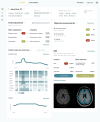A future of AI-driven personalized care for people with multiple sclerosis
- PMID: 39224590
- PMCID: PMC11366570
- DOI: 10.3389/fimmu.2024.1446748
A future of AI-driven personalized care for people with multiple sclerosis
Abstract
Multiple sclerosis (MS) is a devastating immune-mediated disorder of the central nervous system resulting in progressive disability accumulation. As there is no cure available yet for MS, the primary therapeutic objective is to reduce relapses and to slow down disability progression as early as possible during the disease to maintain and/or improve health-related quality of life. However, optimizing treatment for people with MS (pwMS) is complex and challenging due to the many factors involved and in particular, the high degree of clinical and sub-clinical heterogeneity in disease progression among pwMS. In this paper, we discuss these many different challenges complicating treatment optimization for pwMS as well as how a shift towards a more pro-active, data-driven and personalized medicine approach could potentially improve patient outcomes for pwMS. We describe how the 'Clinical Impact through AI-assisted MS Care' (CLAIMS) project serves as a recent example of how to realize such a shift towards personalized treatment optimization for pwMS through the development of a platform that offers a holistic view of all relevant patient data and biomarkers, and then using this data to enable AI-supported prognostic modelling.
Keywords: AI; data; diagnosis; disease progression; multiple sclerosis; personalized medicine; prognosis.
Copyright © 2024 Praet, Anderhalten, Comi, Horakova, Ziemssen, Vermersch, Lukas, van Leemput, Steppe, Aguilera, Kadas, Bertrand, van Rampelbergh, de Boer, Zingler, Smeets, Ribbens and Paul.
Conflict of interest statement
JP is a shareholder of icometrix NV. AR is a shareholder of icometrix NV. DS is a shareholder of icometrix NV. MS has no relevant or material financial interests that relate to the research described in this paper. However, she is employed as Operational Director of The European Charcot Foundation. TZ reports scientific advisory board and/or consulting for Biogen, Roche, Novartis, Celgene, and Merck; compensation for serving on speaker’s bureaus for Roche, Novartis, Merck, Sanofi, Celgene, and Biogen; and research support from Biogen, Novartis, Merck, and Sanofi. VZ is a shareholder of F. Hoffmann-La Roche Ltd PV reports honorarium, contributions to meeting from Biogen, Sanofi-Genzyme, Novartis, Teva, Merck, Roche, Imcyse, AB Science, Janssen, Ad Scientiam and BMS-Celgene. Research support from Novartis, Sanofi-Genzyme and Merck. EK is a shareholder of Nocturne GmbH. DH received compensation for travel, speaker honoraria and consultant fees from Biogen Idec, Novartis, Merck, Bayer, Sanofi Genzyme, Roche, and Teva, as well as support for research activities from Biogen Idec. JR is a shareholder of Imcyse SA. GC has received consulting and speaking fees from Novartis, Sanofi, Janssen, Bristol Myers Squibb, Roche and Rewind. FP provided research support to Neurosciences Clinical Research Center, German Ministry for Education and Research (BMBF), Deutsche Forschungsgemeinschaft (DFG), Einstein Foundation, Guthy Jackson Charitable Foundation, EU FP7 Framework Program, Biogen, Genzyme, Merck Serono, Novartis, Bayer, Roche, Parexel and Almirall, received honoraria for lectures, presentations, speakers from Guthy Jackson Foundation, Bayer, Biogen, Merck Serono, Sanofi Genzyme, Novartis, Viela Bio, Roche, UCB, Mitsubishi Tanabe and Celgene, in addition, received compensation for serving on a scientific advisory board of Celgene, Roche, UCB and Merck, and is an Academic Editor of PLos One and Associate Editor of Neurology® Neuroimmunology & Neuroinflammation, all unrelated to this work. The remaining authors declare that the research was conducted in the absence of any commercial or financial relationships that could be construed as a potential conflict of interest.
Figures


References
-
- Tur C, Carbonell-Mirabent P, Cobo-Calvo A, Otero-Romero S, Arrambide G, Midaglia L, et al. . Association of early progression independent of relapse activity with long-term disability after a first demyelinating event in multiple sclerosis. JAMA Neurol. (2023) 80:151. doi: 10.1001/jamaneurol.2022.4655 - DOI - PMC - PubMed
MeSH terms
Substances
LinkOut - more resources
Full Text Sources
Medical
Research Materials

